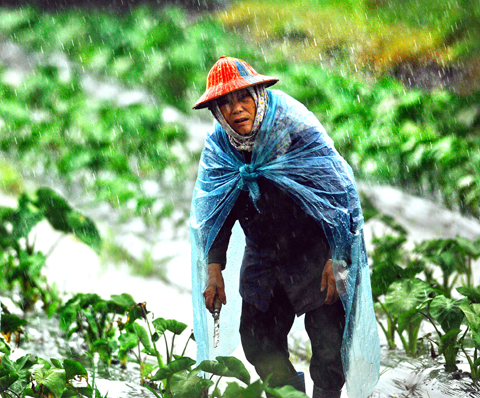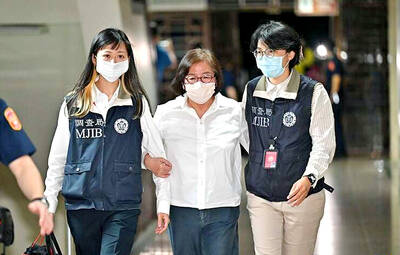While public attention is focusing on a possible Cabinet reshuffle in the wake of Typhoon Morakot, analysts said President Ma Ying-jeou (馬英九) should abandon the pattern of appointing sycophants when he reorganizes the government this week.
Official figures showed that by Sept. 3, Morakot had left at least 614 people dead. The real death toll, however, might never be known because many are feared to have been buried alive in mountainous areas.
The political fallout from the typhoon has included doubts about Ma’s leadership abilities, a lack of trust in his administration, a possible setback in the year-end local elections and plunging popularity levels.

PHOTO: CNA
Ma’s approval rating has plummeted to an all-time low of 16 percent in the wake of the disaster, a TVBS poll showed, while that of Premier Liu Chao-shiuan’s (劉兆玄) fell to 13 percent.
A poll by the Chinese-language United Daily News, a pro-Chinese Nationalist Party (KMT) daily, found that Ma’s popularity had dropped to 29 percent, while Liu’s was 20 percent.
To salvage their sinking popularity, Ma began his “apology tour” on Aug. 19 and Liu moved to the south on Wednesday to gain a better understanding of the worst-hit disaster areas.
Calls for Ma’s resignation and for a Cabinet reshuffle have been heard, while the government watchdog, the Control Yuan, said it would look into the responsibilities of Ma and Liu in the handling of the emergency.
Ma has made it clear that he would not step down. He has also said that he and Liu would determine the nature of the reprimands that will be handed to officials who failed to address the disaster appropriately sometime this month.
Many analysts have speculated that Ma would keep Liu and reorganize parts of the Cabinet.
Hawang Shiow-duan (黃秀端), a professor of political science at Soochow University, said that regardless of whether Ma changed the entire Cabinet or only parts of it, the most important thing remains Ma’s pattern of appointment, adding that Ma has long been criticized for his tendency to hire people who agree with him while swiftly rejecting those who don’t.
“I think the one who most desperately needs rescue is him,” she said. “Although many people think he is clean and law-abiding, there’s always doubts about the manner in which he hires people. As a national leader, his job is to lead, but unfortunately he has failed to do so.”
Ma could never tolerate people like former national policy adviser Lin Huo-wang (林火旺), Hawang said, adding that Lin was too outspoken and different from Ma, who grew up in a well-off family and knew little about hardship.
Lin has openly criticized the Cabinet’s slow response to Morakot and went public about the dismissive attitude of Cabinet officials about Morakot. Lin said he had no choice but to speak out because Ma was not taking his suggestions seriously.
Hawang said Ma did not necessarily have to be the smartest leader, but that he had to realize the importance of appointing individuals who disagree with him or who are even more knowledgeable than him.
“The problem, however, is that he is not only incompetent, but also selfish and reluctant to take responsibilities,” she said.
Hawang said she did not know whether Ma wanted to keep Liu, but if he did, it might be only temporary because Ma is waiting to find someone to replace Liu.
There have been talks about Ma’s intention to recruit local chiefs into the Cabinet, including Taoyuan County Commissioner Eric Chu (朱立倫).
Hawang said she agreed with Control Yuan President Wang Chien-shien’s (王建煊) call that Ma and Liu return to their posts to flesh out and coordinate restoration and reconstruction projects rather than spend most of their time visiting disaster areas.
Apologizing might help him regain some support, Hawang said, but other important matters must be attended to, including the growing threat of the swine flu epidemic, which could soon turn into a national emergency.
“We really don’t want to see more damage control from him when the going gets tough,” she said.
Chen Yen-hui (陳延輝), a professor at National Taiwan Normal University’s Graduate Institute of Political Science, said Ma’s “authoritarian” approach to governance had taken its toll, but the princeling didn’t seem to appreciate its severity.
“Ma usually makes up his mind before he consults his advisers, but the reason why he asks others for their opinion is because he is not certain whether he is right and wants to obtain their endorsement,” Chen said.
Ma’s dismissive attitude has also made things worse, Chen said.
“He may be a good man and a clean politician, but he doesn’t like to take responsibility,” he said.
Chen said that a major Cabinet reshuffle was unlikely and that the government would continue to be run by Ma’s inner circle, such as National Security Council Secretary-General Su Chi (蘇起).
The public must not rule out a comeback of Ma’s confidant, former deputy Taipei mayor King Pu-tsung (金溥聰), Chen said.
As Ma is set to double as KMT chairman starting in the middle of next month, some analysts have predicted that the KMT could suffer a setback in the year-end local elections because of its weak performance in the relief efforts in the wake of Morakot.
Chen, however, said that if the typhoon had hit one month, or even one week, before the elections, the impact would have been substantial. But with its formidable party assets and electoral experience, it is far from certain that the KMT will suffer much in the elections. Furthermore, the worst hit areas are located in the south, traditionally a Democratic Progressive Party (DPP) stronghold, leaving the KMT with more time and resources to prepare for the elections, he said.
Yang Tai-shun (楊泰順), a professor of political science at Chinese Culture University, said the typhoon would have a limited impact on the KMT’s performance in the elections.
“Despite the public displeasure — reasonable or otherwise — with Ma and his administration, voters do not have much choice but to chose the KMT because the DPP is not strong enough to give people hope,” he said.
As long as KMT candidates create a sound image and Ma secures public sympathy for his party, Yang said the typhoon victims, especially Aborigines, will have little influence on the outcome of the elections because “they are marginalized politically and economically.”
Additionally, media attention on the typhoon will gradually switch to other important issues such as the visit by the Dalai Lama, who was invited by the heads of seven local governments in southern Taiwan to comfort and pray for the typhoon victims.
Cabinet reshuffle of not, Yang said Ma has long been criticized for being headstrong. What has compounded his problems, however, is the lack of a sound system to compel the president to listen to his policy advisers.
Despite Ma and Liu’s abysmal approval ratings, Yang said that the UN Office for the Coordination of Humanitarian Affairs had given a positive evaluation of the administration’s response in the aftermath of Morakot.
Yang attributed the unfavorable public perception of the administration’s relief efforts to the people’s high expectations and the media’s political bias in blowing the devastation out of proportion.

Costa Rica sent a group of intelligence officials to Taiwan for a short-term training program, the first time the Central American country has done so since the countries ended official diplomatic relations in 2007, a Costa Rican media outlet reported last week. Five officials from the Costa Rican Directorate of Intelligence and Security last month spent 23 days in Taipei undergoing a series of training sessions focused on national security, La Nacion reported on Friday, quoting unnamed sources. The Costa Rican government has not confirmed the report. The Chinese embassy in Costa Rica protested the news, saying in a statement issued the same

Taiwan is to extend its visa-waiver program for Philippine passport holders for another year, starting on Aug. 1, Minister of Foreign Affairs Lin Chia-lung (林佳龍) said on Friday. Lin made the announcement during a reception in Taipei marking the 127th anniversary of Philippine independence and the 50th anniversary of the establishment of the Manila Economic and Cultural Office (MECO) in Taiwan, the Ministry of Foreign Affairs said. The decision reflected Taiwan’s commitment to deepening exchanges with the Philippines, the statement cited Lin as saying, adding that it was a key partner under the New Southbound Policy launched in 2016. Lin also expressed hope

Temperatures in New Taipei City’s Sindian District (新店) climbed past 37°C yesterday, as the Central Weather Administration (CWA) issued heat alerts for 16 municipalities, warning the public of intense heat expected across Taiwan. The hottest location in Taiwan was in Sindian, where the mercury reached 37.5°C at about 2pm, according to CWA data. Taipei’s Shilin District (士林) recorded a temperature of 37.4°C at noon, Taitung County’s Jinfeng Township (金峰) at 12:50 pm logged a temperature of 37.4°C and Miaoli County’s Toufen Township (頭份) reached 36.7°C at 11:40am, the CWA said. The weather agency yesterday issued a yellow level information notice for Taipei, New

CASE: Prosecutors have requested heavy sentences, citing a lack of remorse and the defendants’ role in ‘undermining the country’s democratic foundations’ Five people affiliated with the Chinese Nationalist Party (KMT), including senior staff from the party’s Taipei branch, were indicted yesterday for allegedly forging thousands of signatures to recall two Democratic Progressive Party (DPP) lawmakers. Those indicted include KMT Taipei chapter director Huang Lu Chin-ru (黃呂錦茹), secretary-general Chu Wen-ching (初文卿) and secretary Yao Fu-wen (姚富文), the Taipei District Prosecutors’ Office said in a news release. Prosecutors said the three were responsible for fabricating 5,211 signature forms — 2,537 related to the recall of DPP Legislator Wu Pei-yi (吳沛憶) and 2,674 for DPP Legislator Rosalia Wu (吳思瑤) — with forged entries accounting for